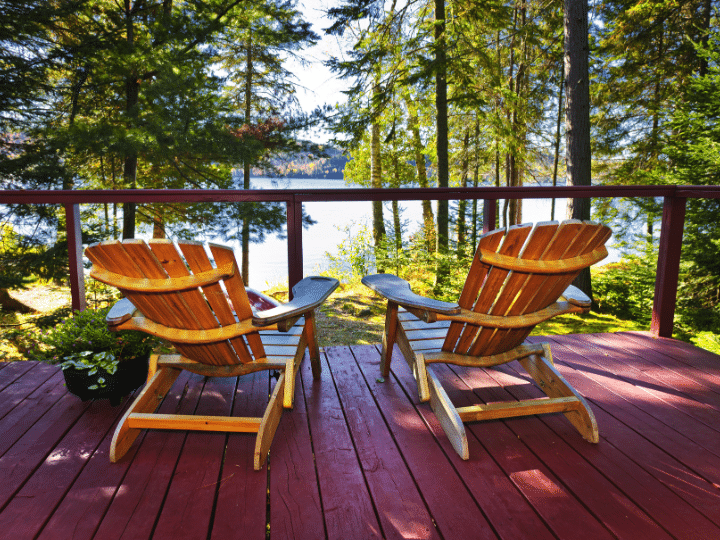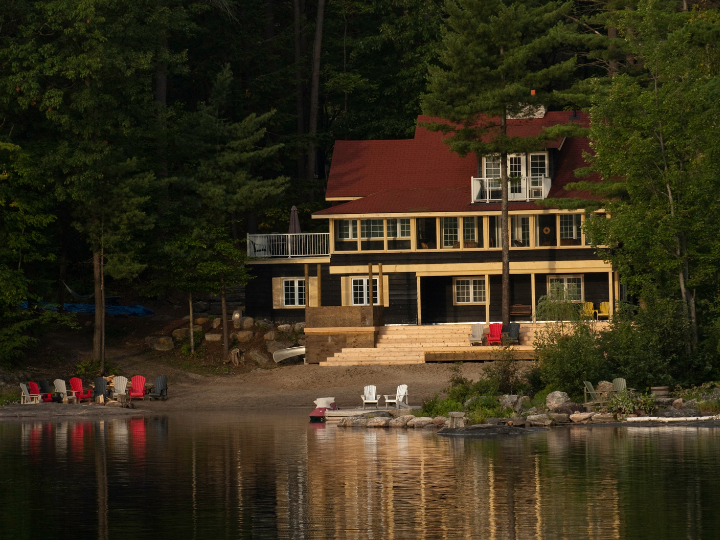Summer is the perfect time to get away from it all, often with the whole family, in your Ontario cottage. Families who own a cottage create generations of happy lakeside memories, playing on the docks and relaxing in the sun. However, when the summer is over, the responsible thing to do is to prepare your cottage for the dormant winter to come.
Ontario summer cottages “hibernate” for the winter and should be prepared for a long season of extreme cold, snowy weather, and disuse. Properly closing up your cottage ensures safety through the winter. This checklist can help you keep the cottage safe and free from damage this year.
Inspect and Seal Up the Cottage
Give your cottage a thorough once-over. Check every nook and cranny. Look for things that need repair and ways to better seal up the cottage so it is in top condition during the several months of vacancy ahead. Repairs and proper sealing can ensure that neither weather nor pests can get into your cottage.
Re-caulk your windows and window frames if the glass rattles or if a breeze can pass through any cracks. Check the weather stripping on your doors and apply new weather strips if they are loose or worn. Look for cracks, small holes, and potential entry points for pests and seal them up.
You also want to check anywhere that a leak might be starting. Damp pipes on the outside or humid cabinets can indicate a small leak, that could become a problem when left alone over the winter.
Clean the Cottage from Top to Bottom
A deep cleaning is also a great idea when packing up your cottage at the end of the summer. Leaving the cottage spotless will ensure it will be ready for summer when you return. Wipe down every surface, fixture, and appliance. This is another chance to check for potential damage or trouble spots before you close the cabin up for the season. Do all the laundry and fold everything into the linen closet or cupboards so it’s ready with fresh beds and towels when you return.
You might also want to leave a mattress cover or fitted sheet on each mattress to protect it from settled dust.
Prepare the Pipes for Winter
There are two ways to prepare your cabin plumbing when closing up for the winter. The first and most common is to drain your pipes and water heater. Doing so will prevent leaks and ensure no water freezes inside the system. Because water expands when it freezes, it can cause your pipes and plumbing fixtures to burst.
The second option is to insulate and heat-wire the pipes. Or you can leave the heater on a low setting all season. This option is preferred by families that periodically use their cottage during other parts of the year or want an easier setup when returning. Of course, this may require a low amount of electricity or gas expenses and some amount of caretaking all year.
Clean and Seal the Fireplace
Warm summer fires on a chilly night are a delight in your cottage’s fireplace. However, you don’t want to leave your fireplace open for birds to nest or for pests to get inside the cottage while you’re gone. Clean out the ash and charcoal from your fireplace, then seal up the flue, chimney, and fireplace before you go. This is a great opportunity to check the brickwork for crumbling or inspect your stovepipe for rust.
Clean and Unplug Appliances
Minimize electricity flow in your cabin while you are gone. Unplug appliances in the kitchen, along with lamps, TVs, and chargers throughout the cottage. This will protect your appliances and cottage from unexpected power surges, even if you disconnect the power at the main switch.
Before you shut off the power, pack all the remaining food into your travel cooler and defrost the fridge and freezer. Unless you are leaving the heat or security systems on, you can shut off the power to minimize property bills while you’re away.
Protect Against Snow
Ontario cottages face one specific challenge you must prepare for: heavy snow. While it may be beautiful in the summer, your cabin will become covered in snow during the unoccupied winter months. With no one there doing routine winter maintenance, you’ll want the place properly prepared to weather the snow. This includes clear gutters, a well-maintained roof, sealed cracks, and proper ventilation.
If you plan to leave the power on, you can set your heat to a low level, just above freezing. With ventilation, the roof will repel snow more effectively and internal pipes can be warmer.
Clean and Test the Sump Pump
Your sump pump is what prevents flooding in the basement or crawl space. It should switch on automatically if water accumulates, but you need to ensure it’s working before closing up for the winter. Clean and clear the sump pump area and use a bucket of water to test the pump activates then clear the accumulated water.
Prepare the Outdoor Property
Once the inside of your cabin is shut down and secure, be sure to secure the outside of the property as well. Start by wildlife-proofing the outdoor areas. Secure any outbuildings like sheds or boat houses from infestation and put away or tie down equipment that mainly stays outdoors. Put your lawn furniture away and close up your outdoor storage.
If you have a slide-out dock, use teamwork to slide it back in and lock it into place to prevent damage through the winter.
Security, Caretaking, or Complete Closure
The final consideration is security or caretaking. Many people who own a cottage or cabin in Ontario have someone who can swing by every month or so during the winter months. A caretaker can check to make sure there is no flooding, short wires, wildlife, break-ins, or weather-related damage. If you leave the power on, you can maintain a security and utility monitoring system instead. Moisture detectors, current and water flow monitors, and a security system can assure you that your cabin is in good shape and ready for a rural escape all year.
Keeping Your Cottage Safe Through the Winter
Your cottage is a wonderful place to spend the summers, and it should stay that way through the winter. The best way to keep your cabin safe from damage during the dormant months is a proper close-up procedure, paired with insurance to cover anything that maintenance and care could not prevent. Get in touch with one of our insurance professionals at Duliban Insurance to review your cottage policy and protect your getaway this winter.








